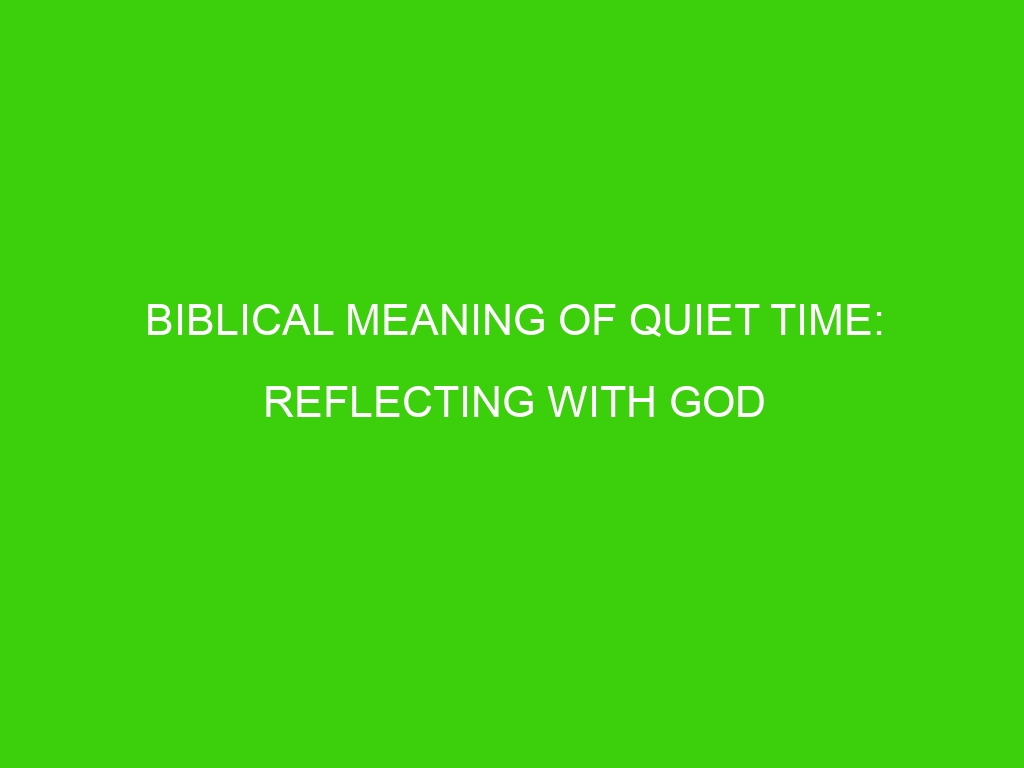You feel it in your soul sometimes, don’t you? Like there’s an itch you can’t quite scratch or a thirst you can’t quite quench.
Your busy life always seems to get in the way of true connection with God.
But what if you could carve out just a little time each day to sit in His presence? Even 10 or 15 minutes can make a world of difference.
The Bible talks about the importance of a ‘quiet time’ – set aside moments where it’s just you and the Lord.
In this article, we’ll explore the biblical meaning of quiet time and how even short reflections with God can renew your spirit.
You’ll discover practical tips for creating your own quiet time habit.
Get ready to experience the power of slowing down and enjoying God’s presence!
What Is Quiet Time in the Bible?
Quiet time is simply setting aside time each day to read God’s Word and pray.
In the Bible, Jesus himself would retreat from the crowds to spend time alone with his Father.
As believers today, quiet time is our opportunity to draw close to God, build our relationship with him, and renew our minds.
Reading Scripture
During your quiet time, read passages from the Bible to nourish your spirit.
Focus on a chapter or passage and meditate on the words.
Ask God to open your heart and mind to understand the meaning and application for your life.
The Bible says “man does not live by bread alone but by every word that comes from the mouth of God.” Quiet time reading helps you feast on God’s Word.
Prayer
Prayer is a vital part of your quiet time.
Pour out your heart to God, confess your sins, give him praise and thanks, and bring your requests to him.
But also make time to listen in prayer.
As you quiet your mind, God may bring scriptures to mind or give you insights.
Be still and know that he is God.
Reflection
Reflecting on God’s Word and works helps quiet time become meaningful.
Consider what you read in Scripture and how it applies to your life.
Think of examples of God’s faithfulness in the past and his promises for the future.
Discuss with God what you’re learning and how you want to grow.
Quiet reflection cements truth in your heart and transforms your mind.
With practice, a dedicated quiet time can revolutionize your walk with God.
Make the time to draw close to your heavenly Father and be refreshed in his presence.
Quiet time fuels spiritual growth and equips you for life’s challenges as you go through your day abiding in Christ.
The Importance of Spending Quiet Time With God
Spending quality alone time with God is essential for your spiritual growth.
Connecting with the Creator helps you find purpose and guidance.
In the busyness of life, it’s easy to lose focus of what really matters.
Setting aside distraction-free time to read the Bible, pray, and listen for God’s voice helps you realign your priorities.
The Bible says Jesus often withdrew to lonely places and prayed.
Following His example, find a quiet space without interruptions where you can pour your heart out to God.
Share your hopes, fears, dreams, and struggles.
Be still and listen for His comforting response.
During your quiet time, read Scripture and ask God to reveal wisdom and encouragement just for you.
Journal your reflections to capture insights you receive.
Quiet time fuels your faith and reliance on God.
As you make seeking Him a daily habit, your confidence in His ability to guide you will grow.
You’ll experience more peace and less anxiety, knowing the Creator of the universe is in control.
Drawing near to God also helps you become more Christ-like as the Holy Spirit transforms you.
Don’t underestimate the power of spending a few minutes alone with God each day.
While it may require effort to unplug from the busyness around you, the rewards of connecting intimately with your Heavenly Father are well worth it.
Let your quiet time with the Lord become an anchor for your soul, keeping you grounded in what matters most.
Make the time to be still and know He is God.
How to Have a Meaningful Quiet Time Each Day
Setting aside time each day to reflect and connect with God is so important for your spiritual growth and wellbeing.
A quiet time is a dedicated time of prayer, reading the Bible, and meditation.
Even taking just 15-30 minutes a day can help you build intimacy in your relationship with God.
Find a quiet place.
Choose a spot where you can be alone without distractions.
Turn off your phone and other electronics.
A comfortable chair, couch, or sitting area is ideal.
Make the space inviting by adding a candle, Bible, journal, or other meaningful items.
Focus your mind.
Spend a few minutes settling your thoughts by taking some deep breaths.
Release any worries, to-do lists, or busy thoughts from your mind.
Ask God to speak to you and give you insight.
Open your heart to hear from Him.
Read the Bible.
Select a Bible passage to read and reflect on.
You might read through a chapter or just a few verses.
Ask God for understanding and how the passage applies to your life.
Take notes or highlight meaningful verses.
Meditate on what God is teaching you.
Talk to God.
Prayer is a conversation with God.
Share what’s on your heart, your struggles, hopes, and dreams.
Praise God for who He is and what He’s done.
Listen for His guidance and ask Him questions.
Be still and listen for His response.
He speaks in a still, small voice.
Reflect and Respond.
Think about what you read and prayed about.
How can you apply God’s Word to your life? Is there an action step God is calling you to take? Write down your reflections, responses, and commitments in a journal.
Review and build upon them in the coming days and weeks.
A meaningful quiet time will strengthen your faith and deepen your relationship with God.
Make it a priority each day to connect with your Creator so you can walk closely with Him.
He longs to speak to you—are you listening?
Biblical Examples of Quiet Time
As followers of Christ, we have wonderful role models in the Bible who cultivated a strong relationship with God through quiet time in prayer, meditation and reflection.
Let’s look at a few examples we can learn from.
David
King David was a man after God’s own heart, and he poured out his soul to the Lord through music and poetry.
Many of the Psalms were written by David during his quiet time with God.
Psalm 63 captures David’s longing and thirst for God’s presence.
He says “You, God, are my God…I seek you in the morning…because your love is better than life.” David’s quiet time fueled his passion for God.
Jesus
Even Jesus himself practiced solitude and prayer.
Mark 1:35 tells us that “Very early in the morning, while it was still dark, Jesus got up, left the house and went off to a solitary place, where he prayed.” Jesus knew the importance of quiet time to reconnect with his Heavenly Father, seek guidance and renew his strength and purpose.
If our Savior needed this time alone with God, how much more do we need it?
Elijah
In 1 Kings 19, the prophet Elijah was discouraged and wanted to give up.
But God sent an angel to minister to him, and Elijah went on a 40-day journey to Mt.
Horeb.
There in a cave, Elijah heard the still small voice of God speak to him.
It was in this quiet place that God renewed Elijah’s spirit and calling.
When we are weary or discouraged, time alone with God can refresh us and give us a renewed sense of purpose.
The examples of David, Jesus and Elijah inspire us to follow their lead.
Making space in our daily lives for quiet time with God through prayer, Scripture reading and meditation will strengthen our faith and deepen our walk with Christ.
As the Bible says, “Be still and know that I am God.” (Psalm 46:10)
Frequently Asked Questions About Biblical Meaning of Quiet Time
What is the biblical meaning of quiet time?
Quiet time refers to setting aside time each day to pray, read the Bible, and reflect.
It’s a chance to strengthen your relationship with God by focusing your mind and heart on Him.
The Bible encourages us to “Be still, and know that I am God” (Psalm 46:10).
Spending quiet time with God allows us to do just that.
Why is quiet time important?
Quiet time is important for several reasons:
-It helps you grow in your faith.
Reading the Bible and praying daily helps you gain wisdom and spiritual maturity.
-It reduces stress and anxiety.
Spending time with God brings an inner peace and calm.
-It gives you guidance and direction.
As you pray and read the Bible, God will speak to you and guide your steps.
-It makes you a more effective witness.
The closer you draw to God, the more His light will shine through you to others.
How do I get started with a quiet time?
Starting a quiet time habit is simple.
Here are some tips:
-Pick a place without distractions.
Find a quiet spot away from technology and interruptions.
-Start small and be consistent.
Aim for just 15-30 minutes a day of prayer and Bible reading.
The key is making it a daily habit.
-Plan ahead.
Choose Bible reading plans or devotionals to follow so you have direction each day.
-Pray.
Talk to God and listen for what He wants to speak to you.
Pray for wisdom and understanding as you read the Bible.
-Journal.
Writing down your thoughts and prayers, and recording what God is teaching you, can make your quiet time even more meaningful.
-Don’t get discouraged.
Don’t be too hard on yourself if you miss a day or two.
Just get back into your routine and you’ll reap the benefits.
A daily quiet time habit will transform your life as you draw closer to God.
Why not start today? Find a quiet place, open your Bible, and begin reflecting on God’s Word.
He is waiting to meet with you!



